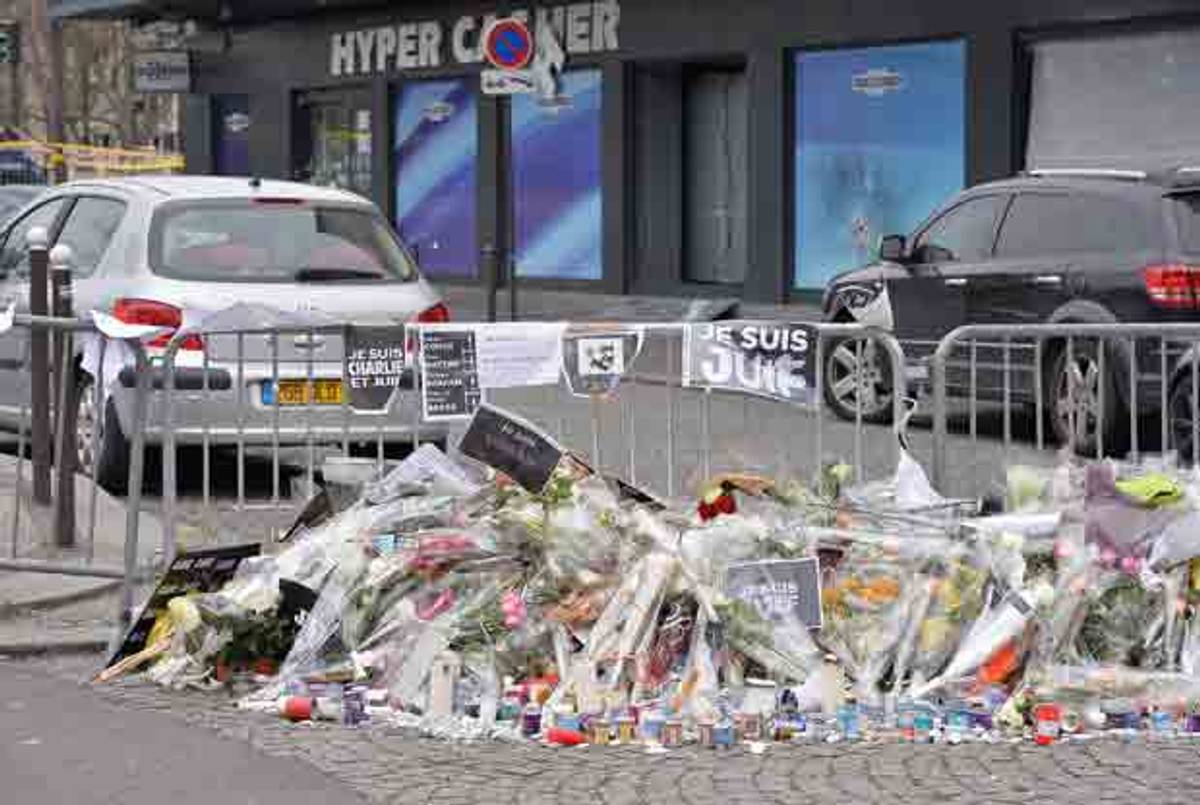
In the wake of the shooting at the Hyper Cacher supermarket in Paris that left four Jews dead, French President Hollande immediately condemned the massacre as an “appalling anti-Semitic act.” These words were echoed last month by President Obama, who said that “Anti-Semitic attacks like the recent terrorist attack on a kosher supermarket in Paris pose a threat that extends beyond the Jewish community.” Obama’s ambassador to the U.N. Samantha Power likewise emphasized that “all four [victims] were casualties of violent anti-Semitism–targets because they were Jews.” After all, the murderer himself, when asked by reporters over the phone if he was targeting the store for a reason, said “Yes, I am: Jews.”
And yet, in an interview with Vox published this week, Obama seemed to say something very different. “It is entirely legitimate for the American people to be deeply concerned when you’ve got a bunch of violent, vicious zealots who behead people or randomly shoot a bunch of folks in a deli in Paris,” he told interviewer Matt Yglesias. To many readers, this implied that the massacre was not a specifically anti-Jewish act, and reporters quickly raised the issue at today’s press briefings.
Now, a charitable reading of the president’s words suggests he was speaking colloquially and did not intend to downplay the anti-Semitic nature of the attack. By “randomly shoot a bunch of folks,” Obama did not mean that the establishment was chosen haphazardly–it was targeted because it was Jewish–but rather that the individual victims were just those who had the misfortune to be inside it at the time. Similarly, the president’s use of the word “deli” could be argued to connote a Jewish establishment, at least to an American audience. In other words, Obama did not aim to elide the attack’s anti-Semitism, he just expressed himself poorly.
It would have been easy enough for the president’s spokespeople to clarify these points today and correct his imprecision. But instead, they did just the opposite, and initially doubled down on the more literal, uncharitable interpretation of Obama’s words. Thus, White House press secretary Josh Earnest told reporters that “There were people other than just Jews who were in that deli.” And State Department spokesperson Jen Psaki–when asked, “does the administration really believe that the victims of this attack were not singled out because they were of a particular faith?”–dodged by saying, “they were not all victims of one background or one nationality” (they were all Jews) and “I don’t think we’re going to speak on behalf of French authorities and what they believe was the situation at play here” (the French authorities were the first people to label the attack anti-Semitic).
Are the spokespeople’s statements a reflection of a darker, more troubling view inside the White House, one that refuses to acknowledge the reality of anti-Semitism in Europe? Not quite. As Hanlon’s Razor says, “Never attribute to malice that which is adequately explained by stupidity.” In this case, what we are seeing is not so much an apologia for anti-Semitism as an apologia for Obama. The president’s team has never been good at admitting his missteps, particularly when it comes to the rhetoric for which he is held in such esteem. This has led Obama’s spokespeople to offer tortured defenses of his least defensible statements, like when he dismissed ISIS as the mere “JV team” of terrorism. In this case, rather than simply admit their boss had erred, Earnest and Psaki tried to reparse his words into something palatable and ended up saying something foolish. Or, as New York‘s Jonathan Chait wryly put it, “Obama fumbles anti-Semitism question, teammates scoop up ball and run into the wrong endzone.”
Indeed, one of the downsides of Obama’s carefully cultivated intellectual persona is that onlookers often mistake his errors for intended actions, not realizing that this president makes miscues like any other. What critics would’ve written off as a gaffe if it came from George W. Bush, they instead see as part of deliberate plan when it comes from Obama. But those who would read a malevolent worldview–rather than mere mangled messaging–into this episode should remember that the Obama administration has in fact been a stalwart critic of rising European anti-Semitism. The president even dispatched his confidant Samantha Power to Berlin to hector European nations about not doing enough to fight it. It is exceedingly unlikely that the administration has suddenly decided that Jew hatred on the continent is no longer a problem.
Sure enough, after the bumbling pseudo-explanations of Earnest and Psaki for Obama’s words garnered scorn online, both took to Twitter to clarify that neither they nor Obama had meant to downplay the anti-Semitism in Paris:
Our view has not changed. Terror attack at Paris Kosher market was motivated by anti-Semitism. POTUS didn’t intend to suggest otherwise.
— Josh Earnest (@PressSec) February 10, 2015
We have always been clear that the attack on the kosher grocery store was an anti-semitic attack that took the lives of innocent people.
— Jen Psaki (@statedeptspox) February 10, 2015
Hopefully, the next time the president errs, his team will simply correct the record the first time, rather than awkwardly attempt to spin his mistake into something more sensible.
Yair Rosenberg is a senior writer at Tablet. Subscribe to his newsletter, listen to his music, and follow him on Twitter and Facebook.